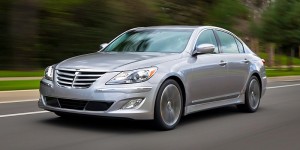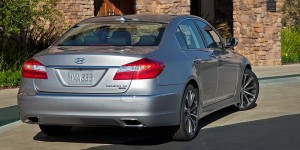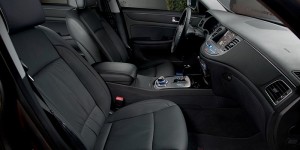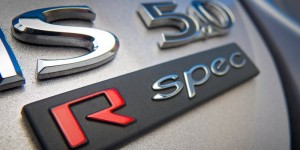In the beginning… Hyundai joined the luxury sedan segment back in 2009. And lo, there was much rejoicing when the company sold over 21,000 units that first year. The other luxury sedan makers didst take notice. Since then, the Genesis sedan has recorded 33 percent year-over-year sales increases. With its 2012 model year refresh, that trend will likely continue.
Available in three engine-specific trim levels – the V6 Genesis 3.8 and V8 4.6 and 5.0 R-Spec – Hyundai’s mid-market luxury sedan offers your choice of value-for-money executive transport or a type of sporting luxe most often associated with German sedans. Opt for the former.
The 2012 Genesis competes in some crowded territory, Hyundai citing the Mercedes E Class, Infiniti M, BMW 5 Series, Chrysler 300 and Cadillac CTS as competitors to name a few. When you’re deep in these mid-size luxury sedan woods it’s good to have a value advantage and all three Genesis trims are competitively priced starting with the 3.8’s $34,200 entry fee.
However if you add the Premium package with its sunroof, DVD/nav system and 18 inch wheels among other amenities, you’re immediately bumping $40k. The Bluetooth, TFT instrument cluster, larger nav display and lane departure warning system of the Technology package push the 3.8 to $43,000. Add the 4.6 liter V8 and the fare rises to $44,500. The R-Spec’s 5.0 liter V8 and other performance bits total up to $46,500, the last a modest enough tithe for a luxury sports sedan.
The 2012 facelift is detectable, just. Outside there are revised headlamps with the now obligatory LED accents. The grille design has been slightly altered, the fascia tweaked a little. Out back a different tail lamp design and bumper with integrated exhausts signal newness. New 17 and 19 inch wheel designs appear as well. The look has more visual hooks than before though no one will accuse the Genesis of really standing out.
The Genesis interior gets mixed marks from me. Comfort and space are present though I find the standard front buckets to have bottom cushions which are too flat. From a styling standpoint, particularly in black leather, the cockpit looks dull and slightly low rent. The silver plastic DVD screen/HVAC control and shifter quadrant surrounds combine with a digital clock to lend an early 2000’s Toyota Camry-esque look. Not good. Choose beige leather and the effect is somewhat minimized. Rear seating is generally comfy and spacious and there are infotainment doodads enough to keep one properly distracted.
Hyundai has endowed the 3.8 V6 with direct injection, giving it 43 more horsepower than the previous 3.8 for a total of 333 horsepower. Fuel numbers of 19 city and 29 highway show the gains come with no fuel penalty. As with the two V8s, the V6 is teamed with a new 8-speed automatic transmission replete with 130 patented technology innovations which Hyundai touts. The 8-speed surely aids fuel economy but the price is slow shifts and some hunting for the right gear. In the comfort/value focused 3.8, the tranny’s shortcomings aren’t highlighted but in the 5.0 R-Spec they become obvious.
The 5.0 R-Spec gets a 429 horsepower direct-injection V8 and a sport-tuned suspension with higher spring rates, stiffer dampers and a bigger rear stabilizer bar. Nineteen inch wheels with Bridgestone summer rubber, headlamps with dark chrome inserts and an “R-Spec” badge complete the package. The power goes down effectively enough for Hyundai to claim a 5.1 second 0 to 60 mph run but the R-Spec just doesn’t feel that fast. There’s little drama and the sedan never urges you to “get on it”
The suspension tweaks and lackluster steering (not objectionable but nondescript) make the R-Spec feel a bit tighter but, tires and power aside, I felt as if I could hustle the 3.8 around a course as effectively as the R-Spec. Further, the transmission won’t hold a gear and the downshifts in particular come so slowly that any giddy driving sensation is erased. In fact, so slow is the shifting, even in manual mode, the driver quickly loses interest in shifting for himself.
Lastly, there’s the “R-Spec” name. No one at Hyundai has sufficiently explained to me just what R-Spec means. “R” does not stand for racing they say. More problematic is the confusion the label creates with the Genesis R-Spec coupe. The company has invested enough marketing resources that when Hyundai-aware consumers hear “R-Spec” their minds picture the coupe. Why confuse the issue?
Hyundai’s Genesis is, like the book’s first couple chapters, still about beginnings. The good thing is that the car has shown progression. However it needs to continue on the path. And for the moment the 3.8 is the best choice to take on the road to enlightenment.
The Specs
Price as tested: $34,200 – $46,500
Engine: 333 horsepower 3.8 liter GDI V6, 385 horsepower 4.6 liter GDI V8, 429 horsepower 5.0 liter GDIV8
Curb Weight: 3824 – 4046 pounds
Fuel Economy: 19 city/29 highway – 16 city/25 highway




Leave a Reply